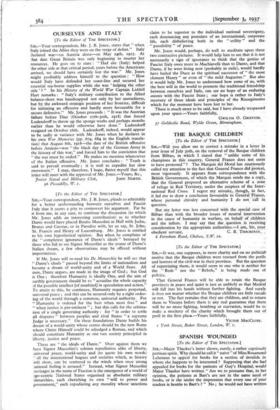[To the Editor of Tim SPECTATOR.] Sta,—Your correspondent, Mr. J.
B. Jones, pleads so admirably fol a better understanding between ourselves and Fascist Italy that it seems a pity to controvert his argument. Far be it from me, in any case, to continue the discussion (to which Mr. Jones adds an interesting contribution) as to whether Dante would have placed Benito Mussolini in Hell with Judas, Brutus and Cassius, or in Paradise with, let us say, St. John, St. Francis and Henry of Luxemburg. Mr. Jones is entitled to his own hypothetical opinion. But when he complains' of the " completest ignorance of Dante's ideals " betrayed by those who fail to see Signor Mussolini as the avatar of Dante's Italian dream, a few observations may be offered without impertinence.
If Mr. Jones will re-read his De Monarchia he will sec that " Dante's ideals " passed beyond the limits of nationalism and became a dream of world-unity and of a World State. All men, Dante argues, are made in the image of God ; but God is One ; therefore Humanity is ideally One, and the aim of earthly government should be to " actualise the whole capacity 3f the possible intellect [of mankind] in speculation and action." To attain to this, he continues, Humanity requires perpetual, universal peace ; and this can be secured only by a right order- ing of the world through a common, universal authority. For " Humanity is ordered for the best when most free " and " when justice is pre-eminent " ; but this calls for the arbitra- tion of a single governing authority : for " in order to settle all disputes " between peoples and rival States " a supreme Judge is necessary." On these foundations Dante builds his dream of a world-unity whose centre should be the new Rome where Christ Himself could be adjudged a Roman, and which should constitute Humanity as one vast society principled in liberty, justice and peace.
These are " the ideals of Dante." Over against them we have Signor Mussolini's solemn repudiation alike of liberty, universal peace, world-unity and (to quote his own words) ` all the international leagues and societies which, as history will show, can be scattered to the winds when once strong aational feeling is aroused." Instead, what Signor Mussolini envisages in the name of Fascism is the emergence of a world of :go-centric National States organised as absolutist military hierarchies, each cherishing its own " will to power and government," each repudiating any morality whose 'sanctions claim to be superior to the individual national sovereignty, each denoimeing any postulate of an international; corporate life, each diabelieVing both in the " utility " and the " possibility " of peace.
Mr: Jones would, perhaps, do well to meditate upon these two contrastive Pictures. It would help hint to see that it is not necessarily a- sign of ignorance to -think that the genius of Fascist Italy owes more to Machiavelli than to Dante, and that Dante, if he were living now (probably in exile), would hardly have hailed the Duce as the spiritual successor of " the most clement Henry " or even of " the mild Augustus." But also it would help Mr. Jones to understand how some of us, with the best will in the world to promote the traditional friendship between ourselves 'and. Italy, can see no hope of an enduring- entente with the Fascist State ; our hope is rather in Italy's recovery of those ideals and -principles of the Risorgimento which for the moment have been lost to 'her.
There is much more to be said, but I have already trespassed upon your space..—Youis faithfully,
GWILYM 0. GRIFFITH.
57 Goldieslie Road, Wylde Green, Birmingham.










































 Previous page
Previous page